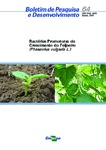Use este identificador para citar ou linkar para este item:
http://www.infoteca.cnptia.embrapa.br/infoteca/handle/doc/1028911| Título: | Bactérias promotoras de crescimento do feijoeiro (Phaseolus vulgaris L.). |
| Autoria: | VIEIRA, R. F.  SILVEIRA, A. P. D. da   FERRACINI, V. L.   PAZIANOTTO, R. A. A.   |
| Afiliação: | ROSANA FARIA VIEIRA, CNPMA; ADRIANA PARADA DIAS DA SILVEIRA, IAC; VERA LUCIA FERRACINI, CNPMA; RICARDO ANTONIO ALMEIDA PAZIANOTTO, CNPMA. |
| Ano de publicação: | 2015 |
| Referência: | Jaguariúna: Embrapa Meio Ambiente, 2015. |
| Páginas: | 34 p. |
| Conteúdo: | Resumo: O objetivo deste trabalho foi avaliar os efeitos da inoculação do feijoeiro com bactérias promotoras de crescimento de plantas. Os microrganismos foram isolados de solo próximo às raízes de feijão, em quatro tipos de solo. Um total d e 360 bactérias foi selecionado quanto à capacidade para produzir fitohormônios e de solubilizar fosfato. As bactérias selecionadas foram testadas no feijoeiro em casa de vegetação. O delineamento experimental foi inteiramente casualizado, em esquema fatorial (2 x 8), com três repetições e os tratamentos: feijão não inoculado e inoculado com as bactérias K24, K36, K71, T30, T79, A24 e T22, isoladamente. Em todos os tratamentos o feijoeiro foi cultivado na presença e ausência de fertilização fosfatada. As bactérias K36 e T79 aumentaram o peso da parte aérea do feijoeiro e seu conteúdo em nitrogênio e fósforo (P), em solo com baixo teor de P disponível. Estes resultados foram obtidos mesmo com o isolado T79 apresentando baixa capacidade de produzir ácido indolacético (AIA) e não sendo a bactéria que mais solubilizou fosfato. O K36, por outro lado, foi o que mais produziu AIA, além de ter sido um dos que mais solubilizaram fosfato. Os resultados foram também discutidos quanto à adequabilidade das técnicas utilizadas na seleção dos isolados. Abstract: The objective of this study was to evaluate the effects of bean plants inoculation with bacterial isolates presenting plant growth promoting characteristics. These bacteria were isolated from the soil near the bean roots grown in different types of soil. The parameters used to select these microorganisms were: ability to solubilize phosphate and the ability to produce phytohormones. The selected bacteria were tested in greenhouse. The experimental design was completely randomized, in factorial scheme (2 x 8), with three replications and the following treatments: bean not inoculated and bean inoculated with K24, K36, K71, T30, T79, A24 and T22 isolates, separately. In all the above treatments beans were grown in the presence or absence of phosphate fertilization. The bacterial isolates K36 and T79 increased the shoot dry weights of bean plants and its phosphorus and nitrogen content in soils with low available P and were considered potential candidates for use as bio-fertilizers. These results were obtained even with the T79 isolate having low capacity to produce indolacetic acid (AIA) and not being the bacteria with largest phosphate solubilizing capacity. The K36 isolate, on the other hand, was the largest AIA producer, in addition to being one of the largest phosphate solubilizing. The results obtained in this work were also discussed regarding the suitability of the techniques used in the selection of PGPB. |
| Thesagro: | Bactéria Estimulante de crescimento vegetal Ácido indolacético Fosfato Feijão Phaseolus vulgaris |
| NAL Thesaurus: | Growth promotion Beans Indole acetic acid Phosphates Gibberellins Zeatin |
| Palavras-chave: | Bactéria promotora de crescimento Bactéria solubilizadora de fosfato |
| Série: | (Embrapa Meio Ambiente. Boletim de Pesquisa e Desenvolvimento, 64). |
| ISSN: | 1516-4675 |
| Tipo do Material: | Folhetos |
| Acesso: | openAccess |
| Aparece nas coleções: | Boletim de Pesquisa e Desenvolvimento (CNPMA)  |
Arquivos associados a este item:
| Arquivo | Descrição | Tamanho | Formato | |
|---|---|---|---|---|
| 2015BP01.pdf | 746,62 kB | Adobe PDF |  Visualizar/Abrir |









